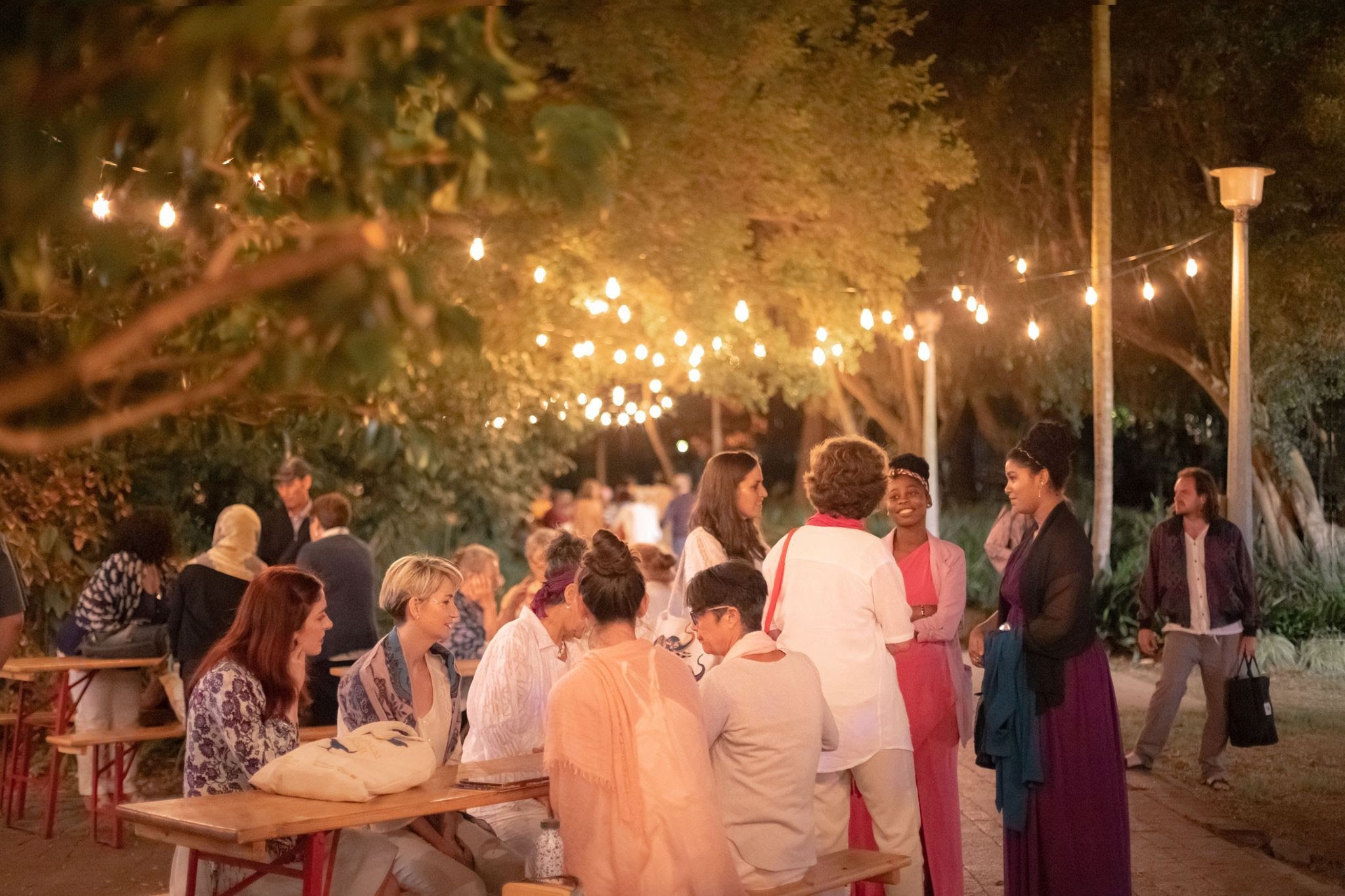It was exactly a year ago that delegates gathered at Spier Wine Farm outside Stellenbosch for the twelfth triennial congress of the Shakespeare Society of Southern Africa. The conference, co-hosted with Wits University’s Tsikinya-Chaka Centre, was held under the theme of Shakespeare Towards An End.
Volumes 36 (2023) and 37 (2024) of Shakespeare in Southern Africa are dedicated to articles, essays and creative works developed from papers that were presented at the conference. Volume 36 was published electronically at the end of last year and print copies are now available too.
Here, we share the editorial introducing this volume by co-editors Chris Thurman and Marguerite de Waal.
The Shakespeare Society of Southern Africa (SSOSA) and the University of the Witwatersrand’s Tsikinya-Chaka Centre (TCC) co-hosted “Shakespeare Towards An End” at Spier Wine Farm in the Western Cape from 24–27 May 2023. This event constituted SSOSA’s twelfth triennial congress and it was the TCC’s inaugural conference. The keynote speakers were Ruben Espinosa of Arizona State University and Jyotsna Singh of Michigan State University. Despite the idyllic setting, there was an urgency and conviction to the gathering, a sense of purpose in creative, scholarly and teacherly responses to Shakespeare alongside all the excitement and fun. It seemed only appropriate, then, to choose as the cover image for this volume a photograph of The Dying Slave: a provocative sculptural installation (designed by Marco Cianfanelli and produced by a team of ten mosaic artists from the Spier Arts Academy) through which delegates passed as they walked from the hotel at Spier to the plenary venue and back each day, voicing a cri de coeur about the role of the arts in expressing pathos, addressing historical injustice and restoring individual dignity.
The conference’s Call For Papers had emphasised “Shakespeare as a means to various ends: that is, Shakespeare as a vehicle that gets us somewhere else.”1 Delegates were encouraged to consider how Shakespeare’s work has travelled, but also to dwell on the ends (aims) that scholars, teachers and creative practitioners have in mind when they tackle this material. The call invited candid explorations of the ways in which Shakespeare can be both a springboard and a barrier to achieving equality and justice in political, economic, social, cultural or linguistic terms, asking: “Whose ends does Shakespeare serve? The centre or the margins, the well-resourced or the under-resourced?” While “Shakespeare has been used to challenge authority”, his work has been “recruited towards bolstering the status quo as often as it [has] towards subversion or resistance”. Shakespeare’s stature, his weight, his gravity, is such that “reading or performing or teaching Shakespeare” inevitably becomes “an end in itself”. On a somewhat portentous – or perhaps liberatory – note, the call text concluded by asking “What would it mean for Shakespeare to ‘come to an end’?” Indeed, one may wonder, what would the end of Shakespeare look like?
Approximately half of the 35 papers that were presented at the conference have been developed into articles, essays and creative contributions for publication in volumes 36 and 37 of Shakespeare in Southern Africa. It is gratifying that something of the breadth of responses to the Call for Papers is reflected in these two volumes, managing to convey to readers much of the intellectual exchange that occurred at Spier but also allowing the delegate-authors to expand their ideas and broaden their scope beyond the constraints of a 20-minute paper and into the more accommodating format of a journal.
Volume 36 opens with Peter Holland’s pursuit of travels with/in King Lear. Holland maps some of the journeys that are undertaken in Shakespeare’s play – or, rather, shows that Lear is “strikingly cavalier with its mapping and its characters’ travels” – before considering a handful of case studies that demonstrate how the play itself has travelled, being “performed, adapted, remade, re-placed” in divergent “cultural conditions”: “a history of relocation, relocation, relocation”. One of the ends of King Lear, Holland reminds us, is purposeful pain; it can help us to learn compassion, to cope with traumatic experiences, such that “its end of opening up justifies the end of its plot”.
Frances Ringwood’s feminist reading of The Winter’s Tale troubles the “(qualified) happy ending” that is granted to Hermione, an ending that mixes healing and restoration with pathos and grief. Ringwood argues that our understanding of Paulina’s “virtuous loyalty” to Hermione, and of the friendship between the two women that allows the play to “transcend a tragedy that would have otherwise been brought about by a tyrannical misogynist”, is enriched by comparisons between Paulina and Boethius’ Lady Philosophy – suggesting that On the Consolation of Philosophy is a (previously unrecognised) source.
Three of the articles in volume 36 are located explicitly in, or rather emerge from, the authors’ engagement with Shakespeare in educational settings. Naomi Nkealah and John Simango discuss the opportunities presented by a primarily biographical introduction to Shakespeare for a group of South African teachers-in-training, many of whom had limited familiarity with Shakespeare’s work prior to their encounter with it in the second year course in question. Students’ responses to Shakespeare’s life story were part of the process of “bringing feminist Shakespeare into the English classroom”.
Linda Ritchie’s article gives an account of her adoption of translanguaging as a pedagogical strategy in teaching Macbeth to a class of Grade 10 learners in a South African secondary school. Ritchie provides an overview of the linguistic inequalities undergirding the South African education system in the colonial and apartheid era – which, sadly, continue into the post-apartheid period – and reckons with Shakespeare’s role in this systemic injustice. She also, however, demonstrates that a multilingual approach to the teaching and learning of Shakespeare in South African schools today has the potential to challenge this legacy.
The young Shakespeareans participating in the project set out in Marta Fossati’s article were located in a very different context to a South African secondary school or university: the Cesare Beccaria juvenile detention centre in Milan. It is here that Puntozero theatre company has undertaken pioneering work, in a unique theatre space – the first “prison theatre” in Europe that has independent status and a public entrance separate from the detention facility. Students and staff from the University of Milan joined Puntozero and a group of inmate-actors in collaborating on a production of Romeo and Juliet that can be described as emerging from a “decolonised” approach to the contested terrain of prison Shakespeare.
There are resonances here with Marc Maufort’s article as it teases out the intertextual relationship between The Tempest and Margaret Atwood’s novel Hag-Seed, which centres on a production of the play at a correctional facility. Maufort observes that “Hag-Seed takes place in landlocked Ontario, Canada, thus prompting us to consider how the Shakespearean text can yield new meanings for the contemporary postcolonial world”. Atwood “amplifies the allusions to performance and directing embedded in the Shakespearean text” by making the plot pivot around a theatrical production; moreover, in addition to the meta-theatrical possibilities created by this premise, “the underlying references to the carceral universe manifest in The Tempest are translated into the use of a real prison as the setting of the novel”.
Maufort locates Hag-Seed “at the crossroads” between modernism and postmodernism: although the novel “relies on a postmodern parodic intervention, it nevertheless adheres to the modernist agenda of achieving social justice and spiritual regeneration through art”. If this leaves us questioning what is intended (or even possible) when Shakespeare’s work is put to a particular purpose, then Catherine Addison’s contribution to volume 36 offers an explicit response. She disputes “arguments that claim the essential utility of the plays – that imply, in other words, that their value is dependent, or partly dependent, on whatever ends they are required to serve”, warning that “to insist that Shakespeare’s dramatic works are, or must be, first and foremost directed towards an end is to deny their actual significance as themselves in favour of something else”. Instead, Addison asserts the “end in itself” of Shakespeare’s play(s).
If theatre makers and other artists must defend the serious business of “playing till doomsday”, then perhaps academics must occasionally exercise a similar prerogative to balance levity and gravity. Peter Merrington does exactly this in his essay on Shakespeare and sovereignty, which focuses on A.S. Byatt’s novel The Virgin in the Garden. Byatt is “earnest” but “also ironic” and “at times satirical”; so, too, Merrington tells us, is his essay, which extends from the coronation of Elizabeth II to that of her son, Charles III, and from Shakespeare’s England to the “troubled republic” of South Africa in its post- apartheid era.
The final article in this volume responds to a seminal Shakespearean phenomenon from the same troubled republic in the early apartheid period. Zwelakhe Mtsaka situates B.B. Mdledle’s isiXhosa translation of Macbeth (published in 1959) in the context of Mdledle’s career as an educator, proposing that this UMacbeth is a form of intsomi or fable, “the function of which is to socialise a young person into responsible ways of behaving”. Equally valuable in appreciating the cultural points of reference that Mdledle probably took for granted among his readers is an awareness of how the witches’ equivocating predictions call to mind the historical prophet-figures Makhanda (Nxele) and Nongqawuse.
The “Shakespeare Towards An End” conference programme included contributions by various creative practitioners: actors, directors, translators, playwrights and poets. It is thus apt that volume 36 also includes “Old Money” by Geoffrey Haresnape. This poem, first published online in 2019, was reworked by Haresnape for the conference and read by him after a series of reflections on the process through which Shakespeare’s King Lear found a South African incarnation.
The volume concludes with a review essay by Tony Voss. The primary text under review is the late Christian A. Smith’s 2022 book Shakespeare’s Influence on Karl Marx, but Voss gets there via Gregory Moore’s edition of Johann Gottfried Herder’s famous treatise on Shakespeare. The result is a wide-ranging account of the German Shakespeare “dialectic”, which has not only been crucial in shaping responses to Shakespeare’s plays since the eighteenth century but has also – precisely because of Shakespeare’s influence on Marx – arguably been an important force in geopolitical and economic terms too. Voss affirms that, while Smith does not “identify Shakespeare as a Marxist”, his book suggests “both Shakespeare and Marx responded to the contradictions and opportunities of their own times in ways that enable us better to understand and respond to our own.”
That, certainly, is an end worth pursuing.














